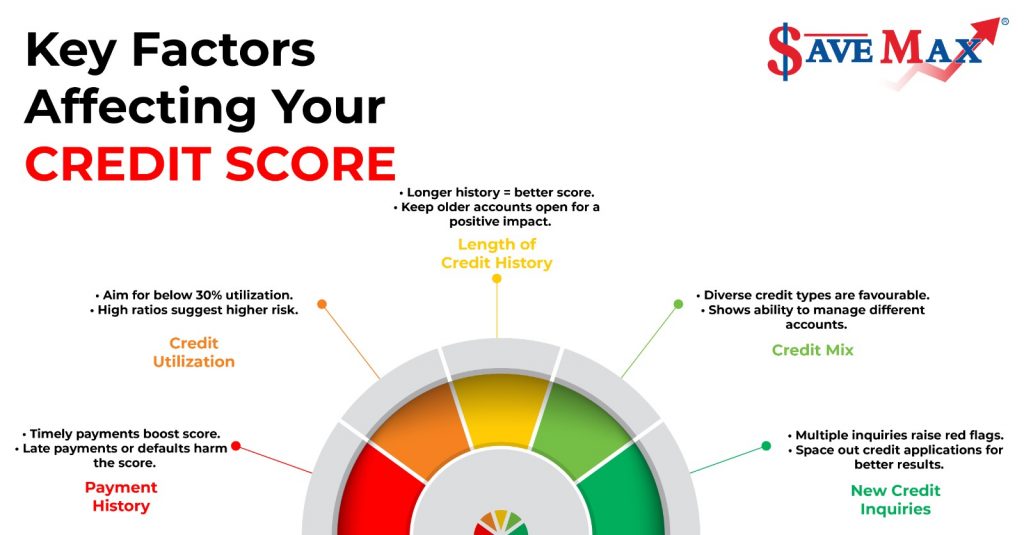Navigating Credit Scores in Canada – Easy Guide for Homebuyers
If you are a potential investor in the real estate market in Canada, credit scores are something that you cannot afford to ignore. In fact, credit scores play an important role not only in real estate but anything that includes finances in Canada– such as buying a car or getting a job. Navigating credit scores in Canada is a skill that you need to learn quickly and well.

As a homebuyer in Canada, credit scores are essential for securing a better interest rate and achieving your homeownership goals. A good credit score assures lenders that you are responsible with credit, increasing your chances of getting approved for a mortgage with better terms.
This guide explains everything you need to know about credit scores in Canada, including how to check them, how to maintain and improve them, and the minimum scores required for homebuyers.
Table of Content
- 1 Breaking Down Credit Scores
- 2 How to Check Your Credit Score
- 3 Credit Score Ranges
- 4 Factors that Affect Your Credit Score
- 5 Strategies to Improve Your Credit Score
- 5.1 Keep Track of Your Credit Utilization
- 5.2 Make Your Payments on Time
- 5.3 Space Out Your Credit Card and Loan Applications
- 5.4 Check Your Credit Reports for Inaccuracies
- 5.5 Avoid Decreasing the Length of Credit History
- 5.6 Diversify Your Credit
- 5.7 Use Secured Credit Cards
- 5.8 Use Credit Builder Tools and Loans
- 6 How Long Does It Take for Credit Scores to Change?
- 7 The Impact of Credit Scores on Mortgage Approvals
- 8 Good Credit Habits for a Homeowner
Breaking Down Credit Scores
A credit score is a three-digit number that reflects an individual’s creditworthiness. It is based on various factors such as payment history, credit utilization, length of credit history, credit mix, and recent credit inquiries. In Canada, credit scores typically range from 300 to 900, with the higher scores being indicative of better creditworthiness.
Why Credit Scores are Important for Homebuyers?
Credit scores play a crucial role in home buying as lenders use them to assess the risk associated with lending money. For instance, you are interested in a house for sale in Markham and looking for a mortgage. A good credit score increases your chances of getting approved for a mortgage and helps you secure more favourable interest rates and terms. The reverse holds true, too – a poor credit score makes it challenging to obtain a mortgage or results in higher interest rates.
Minimum Credit Scores for Canadian Homebuyers
While credit score requirements may vary among lenders across the country, there are minimum credit score thresholds that homebuyers must meet to qualify for a mortgage. It is advisable to aim for a credit score of at least 660.
How to Check Your Credit Score
In Canada, Equifax and TransUnion are the two main credit bureaus responsible for collecting and maintaining credit information. Both bureaus offer credit reports and scores that depict individuals’ credit history and financial reliability. You can directly access credit scores through their websites or via free credit score providers like Credit Karma, Borrowell, and Mogo.
Additionally, several Canadian banks, including RBC, Scotiabank, CIBC, and BMO, allow their banking customers to check credit scores from either Equifax or TransUnion. With multiple avenues for checking credit scores, Canadians have convenient options to monitor their credit health and make informed financial decisions.
Credit Score Ranges
Like we said, credit scores range from 300 to 900 and the table below gives you a snapshot of what each sub-range means for borrowers. If you are a first-time homebuyer, you would be advised to have a credit score above 680 to qualify for lower mortgage rates.
| Credit Score Range | Description |
| 760 – 900 | Excellent: Low-risk borrowers with strong credit histories; likely to qualify for best rates/terms. |
| 725 – 759 | Very Good: Demonstrates strong creditworthiness, increasing the likelihood of favourable loan terms. |
| 660 – 724 | Good: Decent credit history may qualify for loans/mortgages but may face slightly higher rates. |
| 560 – 659 | Fair: Indicates credit issues or limited history; qualifying may be challenging but possible. |
| 300 – 559 | Poor: History of missed payments or defaults; securing loans/mortgages may require credit repair. |
Factors that Affect Your Credit Score
Okay, you have checked your credit score and wish to improve it. Before we tell you how you can do that, it would be wise to understand the factors contributing to your credit score. Understanding these factors can help you identify areas for improvement and maintain a healthy credit score.
Payment History
The most critical factor influencing your credit score is your payment history, which reflects whether you have made timely payments, missed any payments or even defaulted on loans. Use a cash flow analysis calculator to help you plan your finances responsibly.
Credit Utilization
Credit utilization is the percentage of your available credit that you are currently using. You should keep your credit utilization below 30% to maintain a good credit score.
Length of Credit History
The length of your credit history is another factor that you need to keep in mind. Lenders prefer longer credit histories as they provide a more comprehensive picture of creditworthiness.

Credit Mix
A diverse credit mix demonstrates your ability to responsibly manage various types of credit. Different types of credit accounts, such as credit cards, loans, and mortgages, positively impact your credit score.
New Credit Inquiries
Every time you apply for new credit, a credit inquiry is recorded on your credit report. Multiple inquiries within a short period can signal a higher risk to lenders.
Strategies to Improve Your Credit Score
There are several strategies you can employ to boost your credit scores. Rebuilding your credit score takes time and effort, but with consistent positive credit behaviour, you can see improvement over time. So, before browsing for homes for sale in Brampton or your preferred cities, here are some strategies to consider:
Keep Track of Your Credit Utilization
One effective way to improve your credit score is to use less than 30% of your available credit limit on each credit product you have. Pay down existing balances and avoid maxing out your credit cards.
You can contact your creditors to request a credit limit increase to help lower your credit utilization ratio. However, be ultra-cautious not to increase your spending habits simply because you have a higher credit limit.
Make Your Payments on Time
Failure to make payments will negatively impact your credit score. Therefore, ensure you make all your debt payments on time, including credit cards, loans, and mortgages. Set up automatic payments or create reminders to help you stay on top of your payment schedule.
Even if you dispute a bill or have a payment in dispute, it is essential to continue making payments until the matter is resolved.
Space Out Your Credit Card and Loan Applications
A hard inquiry is generated on your credit report whenever you apply for new credit. Too many inquiries within a short period can signal to lenders that you are desperate for credit, so avoid applying for unnecessary credit.
To minimize the impact of credit inquiries, try to limit the number of credit applications you submit. For instance, if you are shopping for a mortgage for a house for sale in Barrie, get quotes from different lenders within a single two-week window. This way, multiple inquiries will be treated as a single inquiry, cutting down the potential negative impact on your credit score.
Check Your Credit Reports for Inaccuracies
Regularly monitor your credit reports for any inaccuracies or errors, as these can result from reporting mistakes or even identity theft.
If you discover any inaccuracies, you have the right to dispute them with the credit reporting agency. The agency will investigate the information and update your credit report if necessary. Correcting inaccuracies can improve your credit score and ensure your credit history is accurately represented.
Avoid Decreasing the Length of Credit History
Closing or transferring old credit accounts to new ones will negatively impact your credit score.
As the length of your credit history is important, keep older credit accounts open, especially if they have a long history of responsible credit use. However, ensure you monitor these accounts regularly to detect unauthorized activity if they are not actively used.
Diversify Your Credit
There are four types of credit in Canada: installment credit, open status credit, revolving credit, and mortgage loans. Consider diversifying your credit by having a mix of these different types of credit accounts.
However, only open new credit accounts if you genuinely need them. Focusing on other strategies to improve your credit score before opening new accounts is essential. Always be careful with your financial and personal information to avoid falling prey to real estate frauds in Canada.

Use Secured Credit Cards
If you have no credit history in Canada or your credit score is too low to qualify for a traditional credit card, you can consider applying for a secured credit card. Secured credit cards require a cash deposit as collateral, determining your credit limit.
Using a secured credit card responsibly and making regular payments can help you establish a positive credit history. Over time, you may be able to upgrade to an unsecured credit card or qualify for other credit products.
Use Credit Builder Tools and Loans
Credit builder tools and loans are specifically designed to help individuals build or rebuild their credit. These financial products allow you to make regular payments, which are reported to the credit bureaus, demonstrating your ability to manage credit responsibly.
Several companies in Canada offer credit builder programs and loans, such as Borrowell, Refresh Financial, KOHO, and Fairstone. These programs can be valuable in improving your credit score over time.
By implementing these strategies and practicing positive credit behaviour, you can take proactive steps to improve your credit score and increase your chances of securing a mortgage for your semi-detached house in Edmonton.
How Long Does It Take for Credit Scores to Change?
Credit scores are dynamic and can change over time, though not overnight. Patience and consistency are key when improving credit scores. Regular monitoring helps track progress and identify areas for improvement.
Improvements in credit scores can be noticeable within 30 days for those with limited credit history or low scores, but achieving excellent scores may take years.
Changes to credit reports take between 30 to 90 days to reflect. Negative information can stay for up to six or seven years, while positive information can remain indefinitely.
The Impact of Credit Scores on Mortgage Approvals
Lenders use credit scores to assess risk and decide your eligibility for a loan. You can use mortgage payment calculators to help determine if you can afford a mortgage.
While a credit score of 660 or higher is usually good for getting approved, your income and debt are equally important factors. A higher credit score means you can get lower interest rates. The Canadian Mortgage and Housing Corporation requires a minimum credit score of 600 for at least one borrower or guarantor when requesting mortgage insurance.

You might face higher interest rates and less favourable terms if your credit score is lower, though there are several lenders who specialize in helping people with lower credit scores.
Take steps as soon as possible toward improving your financial standing and securing a mortgage that fits your needs.
Good Credit Habits for a Homeowner
Maintaining a good credit score is paramount for Canadian homeowners’ financial security. The Financial Consumer Agency of Canada recommends timely mortgage payments and responsible debt management as essential practices.
Remember, building and protecting your credit is an ongoing process that requires diligence and vigilance. With careful attention to these factors, homebuyers can ensure their credit remains strong, providing a solid foundation for buying their dream semi-detached house for sale in Mississauga.
Build a strong financial foundation to help grow your property dreams. For advice and help on anything related to real estate in Canada, contact us at www.savemax.com.
